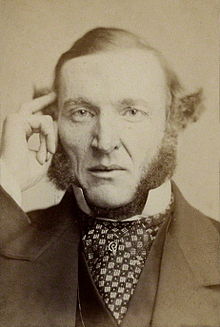Hugh Cairns, 1st Earl Cairns
|
The Right Honourable The Earl Cairns PC QC |
|
|---|---|
 |
|
| Lord Chancellor | |
|
In office 29 February 1868 – 1 December 1868 |
|
| Monarch | Victoria |
| Prime Minister | Benjamin Disraeli |
| Preceded by | The Lord Chelmsford |
| Succeeded by | The Lord Hatherley |
|
In office 21 February 1874 – 21 April 1880 |
|
| Monarch | Victoria |
| Prime Minister | Benjamin Disraeli |
| Preceded by | The Lord Selborne |
| Succeeded by | The Lord Selborne |
| Personal details | |
| Born |
27 December 1819 Cultra, County Down |
| Died | 2 April 1885 (aged 65) Bournemouth, Hampshire |
| Nationality | British |
| Political party | Conservative |
| Spouse(s) | Mary McNeile (d. 1919) |
| Children | 7 |
| Alma mater | Trinity College, Dublin |
| Religion | Baptist |
Hugh McCalmont Cairns, 1st Earl Cairns PC, QC (27 December 1819 – 2 April 1885) was a British statesman who served as Lord Chancellor of Great Britain during the first two ministries of Benjamin Disraeli. He was one of the most prominent Conservative statesmen in the House of Lords during this period of Victorian politics. He served as the seventeenth Chancellor of the University of Dublin between 1867 and 1885.
Cairns was born at Cultra, County Down, Ireland. His father, William Cairns, formerly a captain in the 47th regiment, came from a family of Scottish origin which moved to Ireland around 1715. Hugh Cairns was the second son, and was educated at Belfast Academy and at Trinity College, Dublin, graduating with a senior moderatorship in classics in 1838. In 1844 he was called to the Bar by the Middle Temple, to which he had moved from Lincoln's Inn.
During his first years at the Chancery Bar, Cairns showed little eloquence. He was so slow and diffident that he feared for his legal career. However, in 1852, he entered parliament as member for Belfast, and he became a QC in 1856. In 1858 Cairns was appointed Solicitor-General and was knighted, and in May of that year made two of his most brilliant and best-remembered speeches in the House of Commons. In the first, he defended the action of Lord Ellenborough, who, as President of the Board of Control, had not only censured Lord Canning for a proclamation issued by him as Governor-General of India but had made public the despatch in which the censure was conveyed. On the other occasion referred to, Cairns spoke in opposition to Lord John Russell's amendment to the motion for the second reading of the government Reform Bill, winning the approval of Benjamin Disraeli. Disraeli's appreciation found an opportunity for displaying itself some years later, when in 1868 he invited him to be Lord Chancellor in the brief Conservative administration which followed Lord Derby's resignation of the party leadership. Meanwhile, Cairns had maintained his reputation in debate, both when his party was in power and when it was in opposition.
...
Wikipedia
